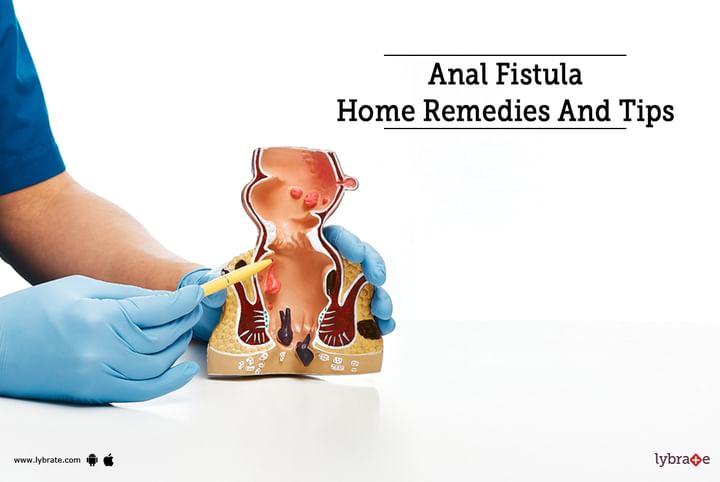Get the App
For Doctors
Login/Sign-up
Last Updated: Mar 14, 2023
BookMark
Report
Anal Fistula Home Remedies And Tips
Dr. Sandip KabraGeneral Physician • 16 Years Exp.MBBS, PGCIH ( Post Graduate Certified In Industrial Health )
What is Anal fistula?
An anal fistula is an aberrant connection between an abscess in the perianal region and the anal canal's epithelialized surface. At the end of the digestive tract, a little tunnel forms between the skin and the muscle opening (anus).
Types of Anal fistula
- Intersphincteric Fistula: This type of anal fistula begins in the inner lining of the anal canal and travels through the sphincter muscle. It is the most common type of fistula and often results from an abscess that has drained through a hole in the lining of the anus.
- Transsphincteric Fistula: This type of anal fistula begins in the inner lining of the anal canal and travels through both layers of sphincter muscles. It is less common than an intersphincteric fistula, but it can be more difficult to treat because it may require more extensive surgery.
- Suprasphincteric Fistula: This type of anal fistula begins above the sphincter muscles and extends into the rectum or beyond. It can occur after a long-term infection or inflammation in this area, such as Crohn’s disease or ulcerative colitis.
- Extrasphincteric Fistula: This type of anal fistula begins outside the sphincter muscles and extends to another area outside of the anus, such as nearby skin or other organs in the pelvic area.Typically, an infection or inflammation in this region, like Crohn's disease or ulcerative colitis, is the cause.
What are the signs and symptoms of Anal fistula?
- Pain: People with anal fistula may experience pain around the anus, especially when sitting or moving around. The pain can range from mild to severe and may be accompanied by swelling, redness and tenderness.
- Discharge: People with anal fistula may have a discharge of pus or blood from the skin around the anus or from inside the anus.
- Itching: Anal fistula can cause itching and irritation in the area around the anus, as well as a burning sensation when passing stools.
- Swelling: People with anal fistula may experience swelling in the area around the anus, which can make sitting difficult or uncomfortable.
- Fever: A fever may be present if an infection is present in the anal fistula.
What are possible complications of Anal fistula?
- Pain and discomfort: Anal fistulas can cause pain, itching, and swelling in the affected area. This can be especially severe during bowel movements.
- Bleeding: Anal fistulas can result in bleeding due to the pressure of passing stools or from a tear in the lining of the rectum or anus.
- Infection: Anal fistulas can become infected, leading to redness, warmth, tenderness, and swelling of the area around the fistula.
- Faecal incontinence: Faecal incontinence, or difficulty controlling bowel movements, is a common complication of anal fistulas.
- Abscess: An abscess may form at the site of an anal fistula due to infection or inflammation caused by bacteria or other organisms trapped in the fistula tract.
Anal Fistula Home Remedies And Tips
- Sitz Bath: This is a simple Ayurvedic remedy that involves soaking in warm water for 10 to 15 minutes. This helps reduce inflammation and pain, and encourages the healing of fistulas.
- Herbal Remedies: Herbal remedies such as neem powder, guggul are known to be effective in treating anal fistulas. Neem is well known for having antibacterial and anti-inflammatory characteristics that can hasten the healing of fistulas.
- Yoga: Regular practice of yoga postures such as vajrasana, supta baddha konasana and shavasana helps to strengthen the pelvic muscles which can promote healing of anal fistula.
- Dietary Changes: Foods such as garlic, onions, ginger, cumin seeds are known to have anti-inflammatory properties that can help reduce inflammation and pain associated with anal fistula. Additionally, drinking plenty of fluids like water or herbal teas can help keep the digestive system healthy which is necessary for the healing process of fistulas.
- Ayurvedic Massage: Abhyangam massage with medicated oils is known to be beneficial in treating anal fistula by improving circulation and reducing inflammation.
- Warm Compress: Applying a warm compress to the affected area can help reduce pain and inflammation associated with anal fistula.By boosting circulation to the area, it can also aid in hastening the healing process.
- Tea tree oil: Due to its inherent antibacterial and anti-inflammatory characteristics, tea tree oil can help lessen the discomfort, swelling, and itching brought on by an anal fistula.
- Apple cider vinegar: Due to its inherent antibacterial and anti-inflammatory characteristics, apple cider vinegar may help lessen the irritation and inflammation brought on by an anal fistula.
- Turmeric: Anal fistula-related discomfort and inflammation may be lessened by turmeric, which naturally possesses anti-inflammatory qualities.
- Aloe Vera Gel: Aloe vera gel contains natural antibacterial, antifungal, and anti-inflammatory compounds that may help reduce inflammation caused by an anal fistula.
- Witch Hazel: Witch hazel is a natural astringent that can help reduce swelling, itching, and pain caused by an anal fistula.
If none of the aforementioned methods work, you may need to consider surgical alternatives.
What are the surgical treatments for Anal fistula?
- Seton placement: A seton is a piece of surgical thread that is inserted into the fistula tract and left in place for several weeks or months. This allows the tract to slowly open up and allow it to drain naturally. It also helps to keep the fistula from closing up and becoming blocked again.
- Fistulotomy: This procedure involves cutting open the fistula tract to allow it to drain. This is usually done under general anaesthetic and can be done either as a day case or as an inpatient procedure depending on the complexity of the fistula. The surgeon will then stitch up the edges of the wound and cover it with a dressing or small bandage.
- Ligation and excision: This procedure involves cutting out a section of the fistula tract, as well as tying off some of its blood vessels to help prevent further infection or recurrence of the fistula. Again, this is usually done under general anaesthetic and can be done either as a day case or as an inpatient procedure depending on how complex the fistula is.
- Fibrin glue injection: This is an endoscopic procedure where fibrin glue is injected into the fistula tract to seal it shut and reduce any risk of infection or recurrence. This procedure can often be done without any incisions being made, which makes it less invasive than other surgical treatments for anal fistulas.
Best doctors to consult for Anal fistula?
- General Surgeon: A general surgeon is the best doctor to consult for anal fistula. They are trained in the diagnosis and treatment of a wide range of conditions affecting the GI tract, including anal fistula. The general surgeon may conduct an evaluation to determine the ailment and formulate a treatment strategy specific to each patient's requirements.
- Colorectal Surgeon: A colorectal surgeon specialises in diseases and conditions of the colon, rectum, and anus. This includes conditions such as anal fistula. The colorectal surgeon may perform diagnostic tests such as endoscopy or imaging tests to diagnose and plan a treatment approach that is tailored to the individual patient's needs.
- Gastroenterologist: An expert in digestive system illnesses, especially those that affect the anus and rectum, is a gastroenterologist. Depending on the cause and severity, they can identify and treat anal fistulas with drugs or other therapies.
- Proctologist: A proctologist specialises in diseases of the rectum, anus, and lower digestive tract, including anal fistulas. They can perform diagnostic tests such as anoscopy or imaging tests to determine what is causing your condition, as well as recommend treatments that will best help you manage your condition.
In case you have a concern or query you can always consult a specialist & get answers to your questions!



+1.svg)
